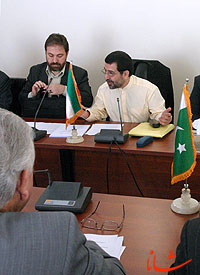Speaking at
He added the two parties also reached an agreement on those sentences the legal advisors had already split.
Ghanimifard said technical points would be studied by the two sides’ engineering groups according to a timetable, paving the way for signing of the contract by the two states’ heads and contracting companies.
Technical and engineering issues under the name of “Operational Agreement” would be studied as the annex of the contract by the two sides’ engineers, said the special representative.
Ghanimifard added the Operational Agreement was a technical text that would be attached to the original contract as its inseparable part, explaining that all international oil and gas contracts had a similar annex.
The NIOC international affairs head said the main technical points of the contract included gas pressure at the venue of delivery and selection of border point for transfer of gas.
He said the Indian party was also willing to rejoin the peace pipeline project, expressing hope the contract would be signed by the three sides.
Shifting to profitability of the project, he said, “The issue should not be compared with the presence or absence of one of the two states,
Under current conditions, the Pakistani side had openly and officially announced it would welcome the transfer of
“
Some part of the Asian market’s need could be met through peace pipeline and some part in the form of liquefied natural gas (LNG) via sea, Ghanimifard added.
“The predictable future shows that we should not focus on
The envoy added exports and presence in the international gas markets was of great importance for
Based on the country’s plan on gas output, the commodity would be exported after domestic need was met and the land’s oilfields received the necessary gas through injection, said the NIOC official.
“It is economically important for
The official added
“Given the growth of domestic economy and the development of local industries, the demand for gas has considerably risen in
The News quoted a senior government official as saying that both sides would review the gas pricing mechanism when there was a change in the correlation between Japan LNG and
A high-powered Pakistani delegation, headed by Qayyum, left for
The Economic Coordination Committee (ECC), in its Oct. 31 meeting, had constituted a steering committee headed by Minister of Petroleum and Natural Resources Amanullah Khan Jadoon, comprising Advisor to Prime Minister on Finance and Revenue Salman Shah, Deputy Chairman of Planning Commission Akram Sheikh, and Chairman of CBR Abdullah Yousaf to look into the GSPA document in detail, which the Ministry of Petroleum and Natural Resources had submitted for approval.
“The steering committee after scrutiny of the GSPA document has given authorization to the
Earlier,
“
“
“So, after hectic deliberations among the stakeholders and experts, Pakistan took a decision to entertain the demand of Tehran with a view to ensure the energy security cover to Pakistan, which is facing energy crisis,” he added.
As per the latest agreement, the formula will be reviewed whenever there will be any change in the correlation between Japan LNG and
However, the official said, a change in the correlation between Japan LNG and
The official said that in case the crude oil price in
However,
He further said that Pakistan has already communicated to Iran that Islamabad stands ready to import five billion cubic feet gas per day through the proposed gas line to make the project more economically viable as India is currently pursuing “wait and see” policy.
Under the earlier proposed 7.3 billion dollars Iran-Pakistan-India (IPI) transnational project,
The official said that in the wake of India’s evasive attitude, as Indian experts did not participate in the recently held meeting in Tehran and Islamabad, both Iran and Pakistan have decided to materialize the IP project.
Under the new scenario, he said, the authorities concerned in


Your Comment